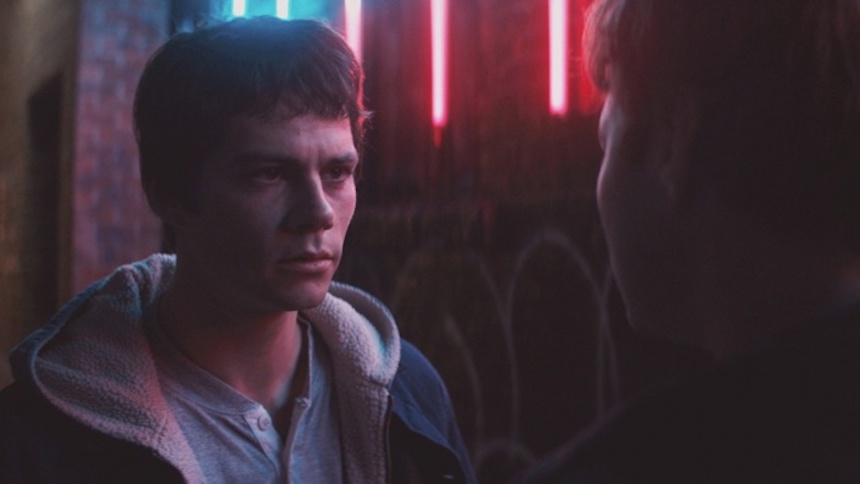Review: FLASHBACK, Aka, 2021: A Space-Time Odyssey
Dylan O'Brien, Maika Monroe and Amanda Brugel star in a dramatic thriller, written and directed by Christopher MacBride.

If Flashback (originally The Education of Fredrick Fitzell), writer-director Christopher MacBride’s (The Conspiracy) first film in almost a decade, is any indication, taking an off-brand, designer drug and getting unstuck in time isn’t conducive to your mental health or emotional well-being.
In fact, it might lead to a steady erosion and eventual dissolution of the difference between objective and subjective reality. By that point, you might just lose yourself in a veritable explosion of light and sound, and if you’re lucky, rapid-fire editing accompanied by strobing light effects and a moody, downbeat electronic score, but like William Shakespeare’s Macbeth mourning the end of the cursed play that bears his name and with it, accepting his own mortality, ultimately signifying nothing.
Before we get to that “nothing” — if, indeed, it’s nothing and not something — MacBride takes the audience on a hallucinatory, time-jumping, reality-bending journey through his central character, Fredrick Fitzell (Dylan O’Brien, American Assassin, The Maze Runner, Teen Wolf), a soft-spoken, enigmatic, thirty-something office drone with a brand-new apartment, a doting, if blandly realized, girlfriend, Karen (Hannah Gross), and an aging mother (Liisa Repo-Martell) slowly dying from dementia or a dementia-adjacent illness (it’s left unspecified, but the prognosis isn't good). A comfortable life and a loving (non) wife, however, aren’t enough to save Fitzell from careening headlong into the grey mist of clinical depression, though it doesn’t help that he has an all-important presentation of a Q2 report due within the next few days.
MacBride initially teases the source of Fitzell’s pre-midlife crisis as a combination of soul-crushing corporate culture, a consumerist culture (both apartment and girlfriend seem more like status symbols than anything else), and the general recognition that financial success has little, if anything, to do with artistic ambition except for a select few, a select few that doesn’t include a constantly doodling, daydreaming Fitzell. A semi-chance occurrence involving a gnomic, ghost-like scavenger in an alley, however, forces Fitzell to begin questioning not just his personal and professional choices, but the nature and fabric of time, space, and reality itself.
Fitzell’s fragile, unstable interior life takes a meandering turn for the worst when memories begin to flood back into his mind involving Cindy Williams (Maika Monroe, It Follows), a onetime high-school dream girl (minus the manic part) who mysteriously disappeared before graduation. Fitzell’s fragmented memories of Cindy become so strong that both his personal life and his professional one begin to suffer.
Karen all but suspects another woman when she discovers Fitzell’s frenzied drawings of Cindy, while Fitzell’s immediate supervisor, Evelyn (Amanda Brugel), stops by his desk periodically to remind him about the potentially career-redefining and/or career-ending report he has to give to C-suite executives. Those reminders eventually border on Office Space levels of farcical, intentional presumably given MacBride’s otherwise tight control over a fairly complex, fractured narrative.
With Fitzell losing his grip on reality, time-shifting between past, present, and several possible futures, MacBride reintroduces two of Fitzell’s high-school friends, Sebastian (Emory Cohen), the dirtbag drug dealer who introduced Fitzell and Cindy to the aforementioned designer drug, Mercury, and Andre (Keir Gilchrist), an anxious, nervy hanger-on. Sebastian and Andre function less as helpers or aides than as obstacles in Fitzell’s semi-relentless quest to uncover Cindy’s fate and her connection to his recently revived memories. Eventually, it all comes to a head (figuratively and literally speaking) with MacBride adding new, potentially fascinating ideas (e.g., simulated realities, alternate timelines, etc.) almost as fast as he drops them for newer, potentially less fascinating ones.
It’s all heady stuff, no doubt, for a film that starts as mildly engaging, generic satire, a Thirty-Something for the start of a new decade, but not one MacBride can manage to sustain across its relatively tight 97-minute running time, due to either a failure of nerve, imagination or quite possibly both in MacBride’s case. The last half hour opens up to the possibilities of choose-your-own-adventures-style branching timelines, a mutable, changeable past, alternate futures (some dire, some not so dire, some more or less attractive than others) before settling on what seems like a disappointingly definitive, status quo-embracing ending that feels like it betrays everything that preceded it, maybe because it does.
Flashback is now playing in select theaters and on VOD. It will be released on DVD and Blu-ray on June 8.







